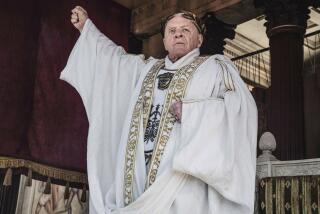Critic’s notebook: Steve Buscemi is the surprise element that makes ‘Boardwalk Empire’ work
“Boardwalk Empire” is one of those Big and Important shows, which means it came with a lot of baggage. Martin Scorsese baggage, “The Sopranos” baggage and general HBO-is-back-in-the-game baggage.
Combining the two major threads of Scorsese’s oeuvre, “Boardwalk Empire” is a period film focusing on gangsters, this time during the early days of Prohibition. As with “The Sopranos,” it showcases the contrast between men who grow increasingly ruthless in their “work” sphere while remaining, or struggling to remain, somewhat humane in their domestic lives. If not instantly generating a “Sopranos” or “Deadwood” level of devotion, “Boardwalk Empire” has performed well and received almost universally positive reviews.
Except for its star.
Casting Steve Buscemi as Enoch “Nucky” Thompson, the man who runs Atlantic City with utter and charmingly matter-of-fact corruption, was an unorthodox decision. With his bulging pug eyes, jack-o’-lantern mouth and air of bony twitchiness, Buscemi is the living definition of character actor. From his role as the frighteningly hilarious hit man in “Fargo” to Tony Blundetto in “The Sopranos,” Buscemi is a custom-made weasel — he even voiced the bad guy in “Monsters, Inc.”
Now, suddenly, he is the conflicted heart of “Boardwalk Empire,” a man who gets a big cut from every deal in town and more showgirl action than Tony Soprano. He also reaches out to aid, then love, Margaret Schroeder (the always lovely Kelly Macdonald), the gentle wife of an abusive alcoholic. (When Nucky has him killed, the viewer can’t help but feel it is for the best; Nucky is that kind of character, “Boardwalk Empire” that kind of show.)
He is, in short, the character we are much more accustomed to see being played by the handsome guys, by Robert De Niro or Jack Nicholson, Al Pacino or Daniel Day-Lewis. The power-mad but still soulful commander of lawless men whose own narcissism and murderous impulses are made more palatable by physical attractiveness. Even James Gandolfini, though not classically handsome, radiates a teddy-bear sweetness and a barrel-chested sexuality.
Buscemi, not so much. Before “Boardwalk Empire,” audiences no doubt believed they could live rich and full lives without ever once seeing Buscemi lip-locked with a topless beauty or in tender and shirtless afterglow. And some believe it still.
Many of the early reviews for the show’s premiere included a negative referendum on Buscemi and the criticism continues. Buscemi, some feel, does not command the screen, does not radiate the kind of roiling storm of machismo yearning we have come to expect from our anti-heroes. Buscemi just isn’t … hot.
Which is why he is the Absolute Best Thing about the show.
For all its period detail and pedigree, “Boardwalk Empire” is nothing new. It’s a gangster tale, made a tiny bit fresh by its time and place, by the in-your-face presence of the temperance movement (although what promised to be a complex and interesting portrait of these women in the pilot has devolved in subsequent episodes). The acting is good, as is the writing, but most of what happens is fairly predictable.
Except Buscemi.
His presence, and his performance, remind us what power and corruption actually look like most of the time, and it isn’t a young Robert De Niro.
Nucky is not a noble criminal, he’s in it for the dough. He will order the murder of the abusive drunk but it doesn’t cross his mind that the temperance movement might actually have a point about “demon alcohol.” He treats fellow mobsters and federal agents with the same level of exasperation that he shows when the midgets he’s hired to play leprechauns on St. Patrick’s Day ask for a raise — the man may run Atlantic City, but he is not above haggling with a midget over a few bucks.
Not surprisingly, he has father issues — the scene in which he burns down his childhood home was gorgeous and unexpected, mainly because it was the first time Nucky chose message over money. When he orders a beating or a murder it is with a sense of irritation — now I’m going to deal with this guy when I’d much rather be getting my shoes shined — rather than either the Shakespearean thunder or psychosis that so many actors feel obligated to conjure when playing a mobster.
Buscemi’s Nucky isn’t a psycho or a dark angel; he’s a guy on the take who kind of wishes he could have a literate wife and maybe some kids, but doesn’t want to give up the hotel suite or the control. Nucky is, like many criminals, stunted, his life nothing more than a well-furnished but still well-worn cage.
Buscemi’s portrait of power is more chilling and thought-provoking than the average gangster because it doesn’t let Nucky, or the audience, off the hook. You can loathe him because he’s corrupt, feel for him because he is human or a little of both. But you don’t get to root for him just because he’s good-looking.
More to Read
Only good movies
Get the Indie Focus newsletter, Mark Olsen's weekly guide to the world of cinema.
You may occasionally receive promotional content from the Los Angeles Times.











